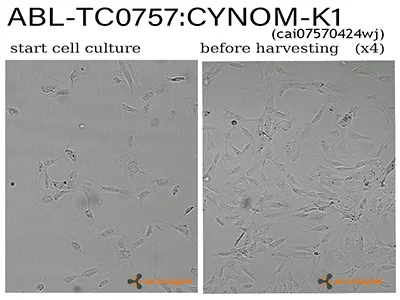Featured Products
Explore Products- In-Stock Tumor Cell Lines
- Human Orbital Fibroblasts
- Human Microglia
- Human Pulmonary Alveolar Epithelial Cells
- Human Colonic Fibroblasts
- Human Type II Alveolar Epithelial Cells
- Human Valvular Interstitial Cells
- Human Thyroid Epithelial Cells
- C57BL/6 Mouse Dermal Fibroblasts
- Human Alveolar Macrophages
- Human Dermal Fibroblasts, Adult
- Human Lung Fibroblasts, Adult
- Human Retinal Muller Cells
- Human Articular Chondrocytes
- Human Retinal Pigment Epithelial Cells
- Human Pancreatic Islets of Langerhans Cells
- Human Kidney Podocyte Cells
- Human Renal Proximal Tubule Cells




 CYNOM-K1 is a non-human primate cell line originating from cynomolgus monkey embryo skin. It lacks tumorigenic properties and serves as a highly susceptible substrate for attenuated Sabin Poliovirus strains. Remarkably, injected mice displayed no tumor formation during the observation period. CYNOM-K1 supports the growth of all three viral types of attenuated Sabin Poliovirus. Additionally, CEBPA-51, a saRNA, effectively activates the transcription factor CCATT/enhancer binding protein alpha (CEBPA) in CYNOM-K1 cells. Recommended culture conditions involve splitting sub-confluent cultures (70-80%) at ratios between 1:3 to 1:6.
CYNOM-K1 is a non-human primate cell line originating from cynomolgus monkey embryo skin. It lacks tumorigenic properties and serves as a highly susceptible substrate for attenuated Sabin Poliovirus strains. Remarkably, injected mice displayed no tumor formation during the observation period. CYNOM-K1 supports the growth of all three viral types of attenuated Sabin Poliovirus. Additionally, CEBPA-51, a saRNA, effectively activates the transcription factor CCATT/enhancer binding protein alpha (CEBPA) in CYNOM-K1 cells. Recommended culture conditions involve splitting sub-confluent cultures (70-80%) at ratios between 1:3 to 1:6.
